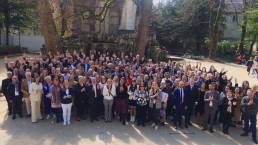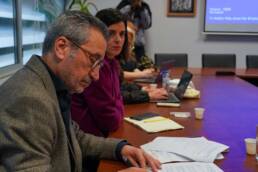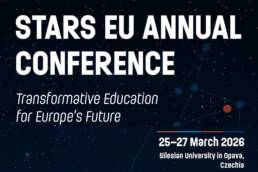One of the objectives of STARS EU is to contribute to regional development, mainly through higher education, research, teaching and transfer activities. And this was the main issue that occupied several sessions of the annual conference of this alliance, held on 21 and 22 March in the French city of Besançon, organised by one of the allied institutions, the University of Franche-Comté.
Thus, in addition to the researchers, professors, technical staff and students who are already part of the alliance, local stakeholders were also invited to this event so that they could contribute their point of view on the role that universities can have in the development of the regions where they are located. These guests participated in a specific panel on this issue, as well as in a working session with the presidents, rectors and TIGS leaders, not to mention the numerous networking opportunities that the meeting facilitated.
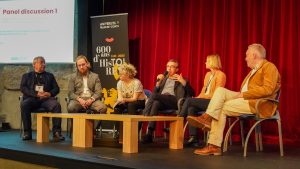
In that discussion panel participated representatives of several regions, such as Benjamin Rodrigues (Bragança Portugal), Christian Schütt (Bremen, Germany), Pauline Prat and Laurent Volle (Bourgogne Franche-Comté, France) and Astrid Burhöi, (Västra Götaland region, Sweden), under the moderation of Daniel Hissel, vice-president of Socioeconomic Partnership and Innovation of the University of Franche-Comté. Issues such as the need to improve digital skills, entrepreneurship and English in professional contexts, and to make the technical person more aware of the socio-political context were raised. STARS EU was seen as an opportunity to bridge the gap that sometimes exists between research and society.
In addition, during the first day of sessions, three other discussion sessions focused on the possible contributions of the alliance to the Research and Innovation Smart Specialisation Strategy (RIS3) from the point of view of knowledge development, STARS EU curriculum and entrepreneurship. These discussions are based on the diagnosis of this strategy developed by the Regional Transition Accelerator, which was presented during the opening of the conference by its coordinator, Marieke Steenbergen.
Opening
The opening ceremony was led by Samir Jemeï, Vice-President in charge of International relations of the University of Franche-Comté and, in addition to Steenbergen, was attended by the President of the host university, Macha Woronoff, the President of Hanze University of Applied Sciences, Dick Pouwels, and the Vice-President in charge of Higher education & Research of the Bourgogne-Franche-Comté Region, Laëtitia Martinez.
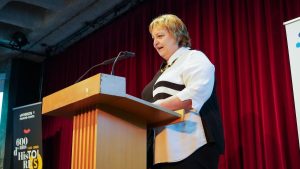
Macha Woronoff recalled that this was the first STARS EU annual conference following the approval in July 2023 of the project submitted to the European Commission, by virtue of which the alliance now has the status of European University. She stressed, however, that STARS EU is not just this project, but a long-term vision that aims to respond to the challenges of the present and the future and to train the leaders of tomorrow who will have to face them.
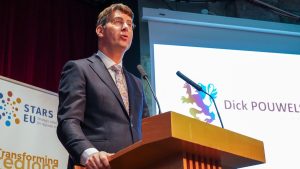
Dick Pouwels congratulated the host university on the recent celebration of its 600th anniversary and, taking advantage of the fact that Besançon is known as the French capital of watchmaking, told a parable in which the protagonist asked the price of an antique watch he had inherited in different shops, and was told in all of them that it was a cheap object. But when he asked in a watch shop, he was told to his surprise that the price was one million. The moral is that the right place and the right people will give you your real value, hence the importance of recognising your own value, and also the value of other people.
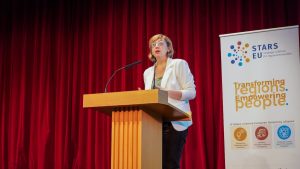
Finally, Laëtitia Martinez explained some initiatives that her region has put in place to bring researchers and decision makers together to find new answers to social, economic and environmental challenges. She also emphasised the need to involve students in the process.
Status of the alliance
As has become customary at each annual meeting, the alliance coordinator, Rima Dijkstra, took stock of the current state of STARS EU, pointing out the goals achieved and also the pending tasks, always with the four main aims of the alliance as a guideline: to develop the European University project; to create a new future-oriented students’ generation, to promote innovative, flexible and diverse challenge-based educational and research systems; and to contribute to green and digital transition and sustainable development of regions.
Thus, with regard to the Regional Transition Accelerator, research on the similarities and complementarities of the partners in the context of RIS3 has been completed, and networking with local and regional stakeholders has begun to be strengthened. Among the challenges, she cited the creation of infrastructures for innovation and entrepreneurship and, in the longer term, making recommendations for a joint policy on regional transition.
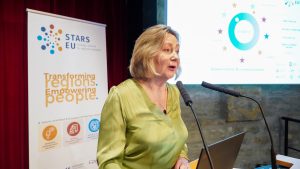
On the collaboration in education, addressed by the Curriculum Lab, the STARS EU Competences Catalogue has already been created and a learning community has been built within the alliance. The next steps are the creation of the Future Competences Catalogue and the Joint Micro-Credential Catalogue, as well as weighing up possible joint doctorates and other academic degrees.
Research is covered by the Challenge Lab, and research priorities have been established, several STARS Talks have been held and the STARS EU Seed Grants for joint projects have been developed. The design of the alliance’s list of research needs and the implementation of the technology transfer office are still pending.
The TIGS has already developed a strategic agenda for the next three years and an action plan for 2024-25, hold regular meetings and develop joint initiatives such as projects, papers, courses and events.
Work has also progressed on the implementation of the STARS EU campus, both physically and digitally, and is currently in the comparative study phase for its development. A challenge identified by Dijkstra was the need to increase student mobility by 50% and staff mobility by 40%.
In terms of dissemination and communication, there is already a Communication Plan for the alliance and its adaptation to the nine allied universities, and the first issue of the quarterly newsletter Nova has been published. It now remains to make progress in branding, improving the website and opening the Open Data repository, as well as training in Open Access.
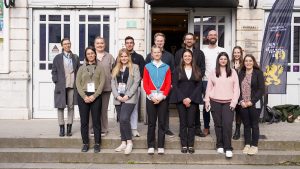
Also highlighted was the activity of the Student Board, which has an action plan for the next academic year and is getting involved in the different working groups of the alliance to ensure that the student perspective is always taken into account.
Among the risks faced by STARS EU, its coordinator pointed out the lack of involvement of staff and students, economic sustainability, mobility, the complexity of legal frameworks for designing joint degrees, and institutional resistance to change, among others.
Finally, the next steps of the partnership are to implement the European project and to apply for Erasmus+, Interreg, Horizon Europe, FP10, national and regional calls for proposals. In the longer term, the legal entity of the partnership will have to be addressed and the extension of the project to more years will have to be tackled.
Other meetings
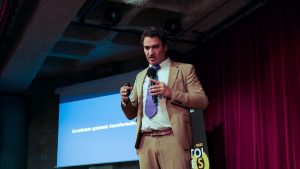
After the opening, the conference itself got underway, with guest speakers including Karel Haegeman from the European Commission’s Joint Research Centre, who gave a provocative presentation on the role of universities and innovation in achieving place-based transformation; and on Friday 22nd, Pam Fredman, who presented her WEXSUS (West Sweden Nexus for Sustainable Development) project, which has started in 2024 after several years of preparation, with the aim of creating an “arena” in which universities and local actors collaborate.
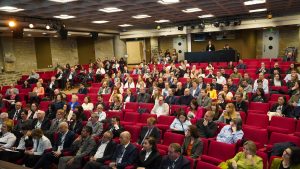
In addition, the teams in charge of the tasks of the eight project work packages, the TIGs, the alliance groups, the STARS EU commission and the steering committee were able to advance their work, with the advantage of being able to do so face-to-face and not virtually, as is the norm in the alliance. The in person meetings are assets that not only allow work to progress, but also strengthen links between members, which also has a positive effect on the purely professional side.
That is why the alliance will continue to promote, as far as possible, on-place meetings. The next ones will be on 5 and 6 November at Bremen University of Applied Sciences, to continue monitoring the progress of the European project, and in 2025, on 21 and 22 March for the next annual conference, this time in Albania, organised by the Aleksandër Moisiu University of Durrës.
(Photo credits: all images in the body of the text have been taken by Nuno Nascimento, from Polytechnic Institute of Bragança. The group photo in the header has been provided by the University of Franche-Comté).
Related Posts
February 6, 2026
Celebrate the International Day of Women and Girls in Science with STARS EU
The alliance demonstrates its commitment to full and inclusive participation of…
February 3, 2026
Bragança Polytechnic University and University West strengthen their strategic cooperation in research and doctoral training within STARS EU
The meeting addressed the implementation of joint doctorates and the connection…
January 30, 2026
Education to address new challenges, focus of the third STARS EU Annual Conference
The next event will take place in March 2026 at the Silesian University in…

